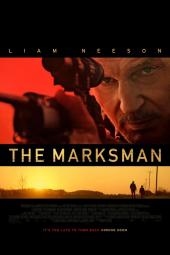This review may contain spoilers!
The Marksman follows a former Marine turned rancher as he aids an orphaned Mexican child across the border and to his family in Chicago, all the while remaining fugitives to a group of cartel assassins hot on their heels. While the film has a very generic approach to Mexican cartels there is a strong depiction of wild and unpredictable violence from these antagonists that lends some tension to the film. I also liked how the film had a theme around preserving the innocence of the child character, 'Miguel'. Keeping him away from the violence as best as the feature could in order to hold him in a state that could be considered 'good' while leaving the protagonist and antagonist as the ones capable of the capacity for murder was an interesting take.
The best performance came from Liam Neeson, who played Jim. As a lead Jim isn't always the easiest to relate to but he is certainly a very grounded role. He's an older man who is tied to a day to day routine and seems lost after the death of his wife. Neeson really shows him as a bit of a desperate figure at first, wanting to save himself and his land but finding little options at every juncture. He has a small temper and lashes out at things that irritate him or cause him problems. Yet as the film goes along and we see Neeson push this sense of growing compassion for his child co-star through, we get this warm feeling about the bond they now share. Jim isn't a complex role by any means but his sense of humanity and the resolution in him all stems from Neeson.
The Marksman is a feature that doesn't really understand much of what it's talking about; I certainly don't believe the screenwriter has any competency at understanding the Mexican cartels, Mexican culture, the process of immigration or illegal immigration. As a result of this we get this really warped sense that the Mexican gangs are glorified thugs, the process of illegal immigration is really simple and that the protagonist is fairly justified when he says ridiculous statements like "the government should really sort its shit out" in relation to the immigration situation. The whole film tiptoes around its evident prejudice against Mexican people while promoting old, reckless Americans with a vigilante knack for wielding a gun as some sort of martyr-like champion. It's a very rotten film riddled with a lazy plot, generic story elements and empty themes. Watching the main character treat his dog better than he ever treats any of the Mexican characters left a bad taste in my mouth and it never really felt like his bond with he kid was a sincere one. Watching things like a military medal palmed around as an empty symbol was weak writing and even worse than that was was watching the main antagonist stumble through an impassioned speech about never having a choice in being a soldier. The cinematography only ever held its ground when it was showcasing an establishing shot, with many scenes feeling very contained and hasty. The editing set a dull tone, with a lot of the cuts and transitions actively looking quite bad. The score for the film had a rustic country ballad feel, which served the setting more than the tone and left The Marksman with quite a fatigued musical accompaniment.
Jacob Perez and Teresa Ruiz, who played Miguel and Rosa respectively, were very generic as the foreign victims in need of rescuing in this feature; Perez never had a strong bond with Neeson which cost the film a lot of its emotional mileage. Juan Pablo Raba, who played Mauricio, was laughable as the main antagonist for the feature; he never felt much more than a henchman for some bigger threat and his big character monologue in the final confrontation was one of the worst deliveries in the film. Katheryn Winnick, who played Sarah, really struggled to find some kind of emotional bond with Neeson as his on-screen daughter; her stiff approach as a law enforcement official and unfulfilled story arc made her an unnecessary addition to the feature.
An underwhelming film that highlights a lot of flaws in American film-making and is notably a career low for Neeson. I would give The Marksman a 3.5/10.




